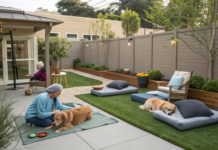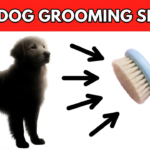Last Updated on January 4, 2024 by Dogs Vets
Senior Dog Care: Keeping Your Aging Pet Comfortable
As dogs age, their needs and abilities change. Senior dogs often require more attention and care to ensure their comfort and well-being. This phase of a dog’s life can be a beautiful time of companionship, filled with serene walks and quiet afternoons.
In this article, we’ll explore how to make your aging pet’s life as comfortable and joyful as possible, from diet and exercise to their living environment.
Creating a Comfortable Living Space
A comfortable living space is vital for a senior dog. Consider providing an orthopedic bed that supports their joints and keeps them warm.
For homes using solar panels, ensuring a steady power supply to maintain a consistent temperature can be especially comforting for older dogs who may be more sensitive to cold.
Adjusting the Diet for Aging Dogs
As dogs age, their dietary needs change. Senior dogs often require food that is easier to digest and lower in calories but still full of nutrients.
Consult your veterinarian to find a diet that supports your dog’s specific health needs, including any supplements for joint health or cognitive function.
Maintaining Regular Exercise
Exercise remains important for senior dogs, but it should be tailored to their capabilities. Short, gentle walks and light play sessions are ideal. Be mindful of their energy levels and any signs of discomfort during exercise, and adjust accordingly.
Regular Veterinary Check-Ups
Regular check-ups with the vet are crucial for monitoring the health of a senior dog. These visits can help catch any emerging health issues early and provide a chance to discuss pain management, dietary changes, or other specific senior dog care needs.
Managing Mobility Issues
Many older dogs experience osteoarthritis or mobility issues. Ramps or steps can help them access their favorite spots without strain. Non-slip mats or flooring can provide additional support and prevent falls.
Mental Stimulation for Senior Dogs
Keeping your dog mentally stimulated is just as important as physical exercise. Provide toys that encourage problem-solving, and continue to engage them with gentle training exercises. Mental stimulation can help maintain their cognitive function.
Special Care for Sensory Loss
Aging dogs often experience a decline in their senses. Accommodate for any loss of sight or hearing by keeping your home layout consistent and using cues like clapping or scents to guide them.
Creating a Stress-Free Environment
A peaceful environment is key for older dogs. Avoid loud noises and sudden changes that might cause anxiety. Create a safe, quiet space where they can retreat to when they need calmness.
Cherish Every Moment
Caring for a senior dog involves a blend of love, patience, and attentiveness to their changing needs. It’s about making small adjustments to your routine and home to ensure they remain comfortable and happy in their golden years.
Remember, each day with your senior dog is precious. By providing the right care, you can help them enjoy this stage of life with dignity and comfort, continuing to build beautiful memories together.
So embrace this journey with your aging companion, ensuring their twilight years are filled with the same love and care they’ve given you throughout their lives.
Fact Check
We strive to provide the latest valuable information for pet lovers with accuracy and fairness. If you would like to add to this post or advertise with us, don’t hesitate reach us. If you see something that doesn’t look right, contact us!























